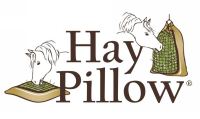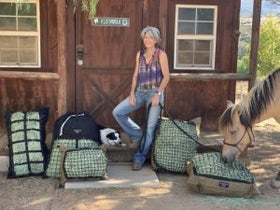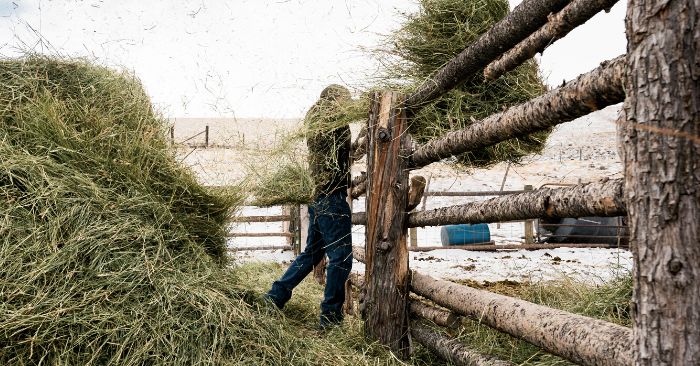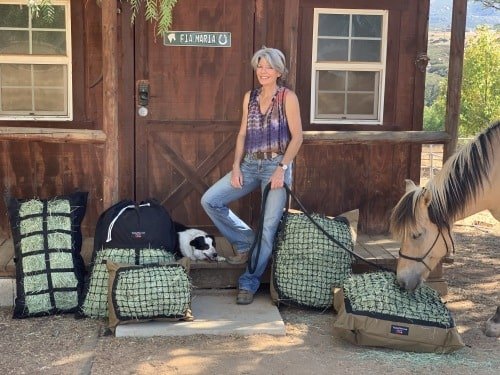Are You a Prisoner of Feeding? Here's How I Broke Free
Is there a way to free yourself? Absolutely! You will be happier and your herd will love you for it. More relaxed herd = more relaxed guardians and vice versa.
For most of us, we become a POF because we don't want our beloved equines to be overweight or without forage for an extended period of time. And so the multiple feedings begin! I too was a POF: getting up early to feed in the morning, making sure I was home to feed lunch, and feeding late in the evening hours (horses only sleep 3-4 hours throughout a 24 hour period).

What inspired me to write this article? Answering questions and hearing comments from our awesome customers! Most of us cannot comprehend our horse or herd maintaining a healthy weight without limiting access to forage for periods of time. But there is another way.
What I share below I learned through four decades of trial and error. You get to skip straight to the good stuff. And if you want to learn more, feel free to check out How to Introduce & Incorporate Free-Choice Forage: An Action Plan - my calculated personal approach to slow-fed, free choice forage.
My Personal POF Journey & Learning Curve
- For 30 plus years, I fed a flake or two twice a day in a metal feeder hung on the corral rail and never questioned it.
- 12 years ago I started to study nutrition because my mare was insulin resistant. I diligently followed the protocol: 1) Tested my hay to ensure it had less than 10% NSC; 2) Formulated a custom supplement mix to balance out the minerals; 3) Continued to provide routine exercise; and 4) Weighed my hay and fed exactly 2% of my horses body weight because scientifically that was the correct amount to provide. I fed my hay loose in tubs.
- 11 years ago I discovered the slow feeding concept and purchased a wide variety of products on the market. My horses ate slower but still were without forage for 8-10 hours in a 24 hour period.
- 9 years ago I started designing and prototyping slow feeders. 8 years ago I invented the Hay Pillow. My horses ate even slower but still were without forage for 4-6 hours in a 24 hour period. Despite my very best efforts, attempting to accomplish free choice forage fed at 2% of their body weight was a fail! Desperate whinnies still greeted me when I arrived at the barn and I felt guilty about their desperation.
- 3 years ago, despite reading numerous Dr. Getty articles, I remained skeptical about feeding free choice forage. I was talking to a friend about my guilt feelings and she said "just load up enough Hay Pillows to last them between feedings and get over it; they'll be fine!" And thus I embarked on my slow fed free choice forage journey.
- The end result: It actually worked - and worked really, really well. I quit my job weighing hay and getting up at the crack of dawn to feed. My horses consumed more hay (I knew this by counting poops!) and didn't gain weight! I eventually had to increase the mesh sizes to encourage them to eat more because they started to lose weight - even though they were eating more than they were prior to free choice forage. Wait, what...? Yes - they were eating more, they always had hay available, and they lost weight.
Eating More & Not Gaining Weight?
- I did my homework by testing and balancing my hay ensuring a less than 10% NSC diet.
- Their diet included the vitamins, minerals and nutrients required for proper hormone and thyroid function.
- They were not isolated - instead my horses lived together and were able to physically interact with each other.
- Multiple feeding stations were provided outside and under cover to eliminate food aggression, encourage movement, and allow them to eat where they were most comfortable mentally and physically.
- Supplied slow feeders and made sure the mesh size enabled them to extract hay without being frustrated. Frustration is counter productive - it causes stress!
- After about 1 week of slow-fed, free choice forage, my horses took frequent breaks throughout the day and night consuming their caloric intake more consistently over a 24 hour period.
The Missing Link - Not Considering the Whole Horse (Mentally & Physically)
In hindsight, I was ignoring the physical and mental aspects of an herbivore and the direct results from the lack of forage. Mental and physical experiences are synonymous in that each has an influence on the other.
- Equines produce gastric acid 24/7 in preparation for constant uptake.
- The average horse produces 16 gallons of gastric acid daily and the stomach only has a 2 to 4 gallon capacity.
- The lower half of the stomach, in addition to producing the acid, receives protection by also producing mucus. The upper half or non-glandular part has squamous epithelium – similar to our skin which provides no protection and is far more susceptible to damage by gastric acid.
- The stomach can empty in 20 minutes - 2 hours depending on the type of feed. The math results: 16 gallons divided by 24 hours = .66 gallons per hour - let's assume the stomach empties in 1 hour - with a 3 gallon capacity the gastric acid can reach the upper half of the stomach (1 1/2 gallons) in a little over 2 hours. In addition, the pH of the acid is not being reduced by saliva because chewing activates saliva production. Due to this fact alone, equines were not designed to be deprived of forage long enough for the gastric acid to reach the unprotected upper 1/2 of the stomach.
- “It is well-known that horses are trickle feeders that would naturally consume a semi-continuous supply of forage for 40-70% of each 24-hour period,” explains Martine Hausberger, PhD, director of the Laboratory of Animal and Human Ethology, a branch of the French national research center (CNRS) and the University of Rennes. “It is also known that horses can experience gastrointestinal discomfort if deprived of food for a mere one to two hours.”
- They determined how often and how long to take breaks from eating. They weren't taking breaks because they ran out of forage.
- Free choice forage is innate. Horses are designed to eat small amounts over time and move about. Despite domestication it is optimum to provide as many aspects of their innate mental and physical being. Both affect each other.
Is Lack of Forage Stressful?
- I no longer heard desperate whinnies when I arrived at the barn to feed supplements and replenish Hay Pillows. Most of us can recognize the difference in whinnies and nickers in regards to what they are feeling emotionally.
- My horses did not anxiously attempt to eat as fast as possible as soon as I provided replenished hay bags - because they were never empty.
Imagine...Breaking Free, Guilt Free
- Sleeping in and having coffee before you go to the barn and your herd is munching on hay or taking a nap when you get there.
- Going to dinner with friends after work and your herd is content when you get home.
- Leaving for the entire day and your herd has plenty of hay when you get back to the barn.
- Going out of town and having a pet sitter visit only once or twice a day without your herd running out of hay.
- Running late, caught in traffic, stop at your favorite tack store on the way home? No worries!
Take Home Message
- Offering him the most natural lifestyle possible
- Minimizing any stress factors
- Meeting his innate needs physically and mentally
Scientifically, my horses were "fine" without free choice forage. Yet after researching the equine anatomy and witnessing their reaction when I arrived to the barn to feed, I knew I could do better.
Yes, I spent time improving their diet, but the peace of mind I have is priceless. The results of my journey are also scientific in that my horses daily intake exceeded what was considered the optimum/appropriate amount of forage and yet they maintained a healthy body weight.
In addition, the only vet bills I've had are yearly dental visits and an occasional chiropractic adjustment. I am not insinuating in any way that free choice forage will prevent or cure any and all sicknesses or diseases. Certainly, minimizing stress factors and addressing diet enables the immune system to function more effectively. I do know my horses are happier and healthier regardless and I'm no longer a POF. It only took me 42 years to get there!
More Helpful Slow Feed Resources
- Free Choice Forage Action Plan
- Feeding Miniature Horses & Donkeys: Why Slow Fed Forage is Best
- How & Where to Test Your Horse's Hay & Interpret Results
- Sand Colic - The Surprising (Simple) Cure & Prevention
- A Safer Always Have Hay Source – Mature Grass Hay
- 6 Great Reasons to Feed Your Horse from Ground Level
- 9 Benefits of Slow Feeding Horses
- 7 Slow Feed Dos and Don'ts for Horses
- 7 Easy Ways to Help Prevent Colic
- Why You Shouldn't Transport Horses On An Empty Stomach
- Keeping Horses Warm Naturally – Internally and Externally
- Why Most Horses Prefer to Eat Outside
- Horse Boredom Busters - Toys & Enrichment Tips for Stall or Pasture
References
- What You Need to Know About Equine Stomach Acid retrieved from: https://thehorse.com/110702/what-you-need-to-know-about-equine-stomach-acid/
- All Wound Up: Is Your Horse ‘Stressed Out’? retrieved from: https://thehorse.com/113401/all-wound-up-is-your-horse-stressed-out/




